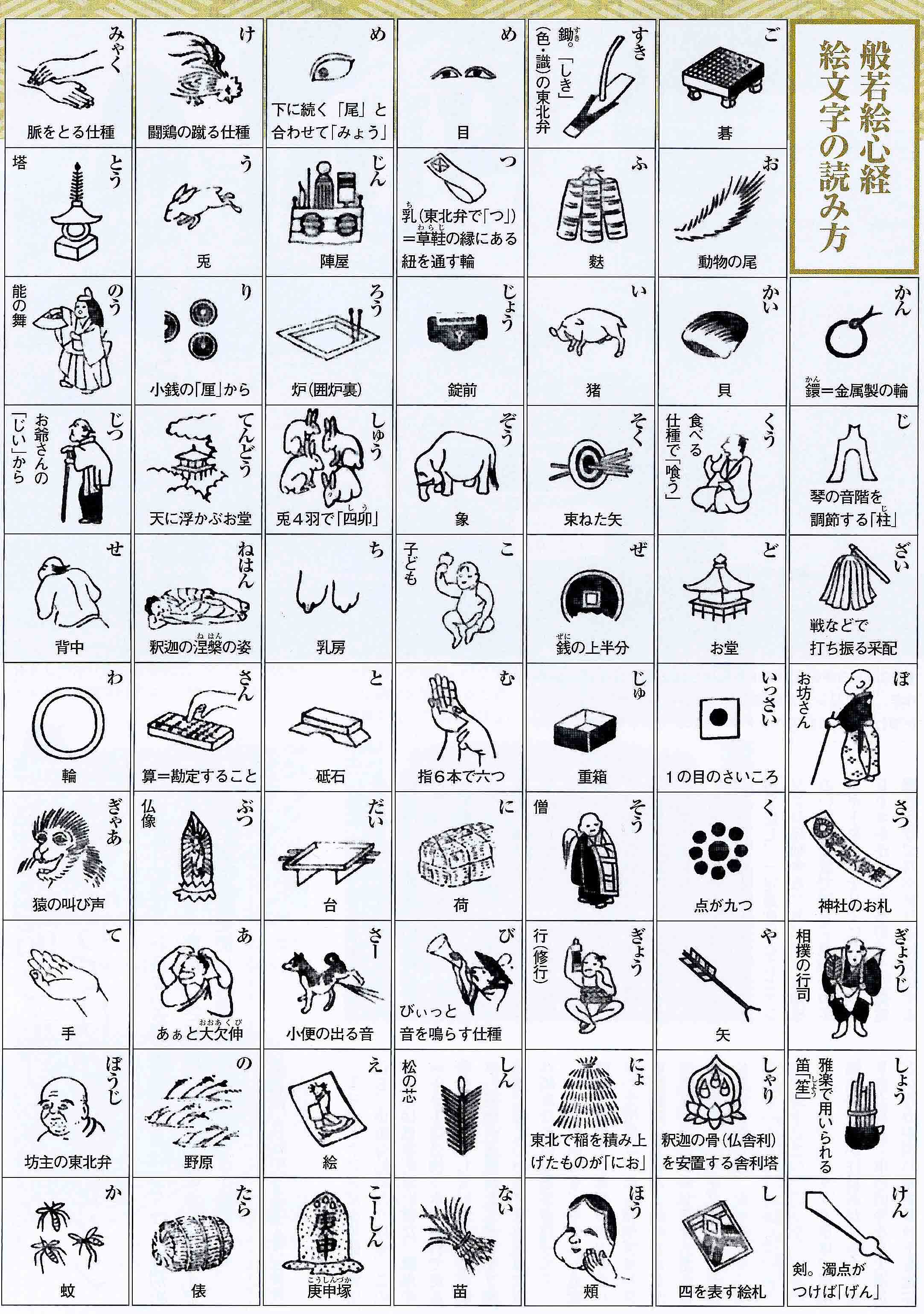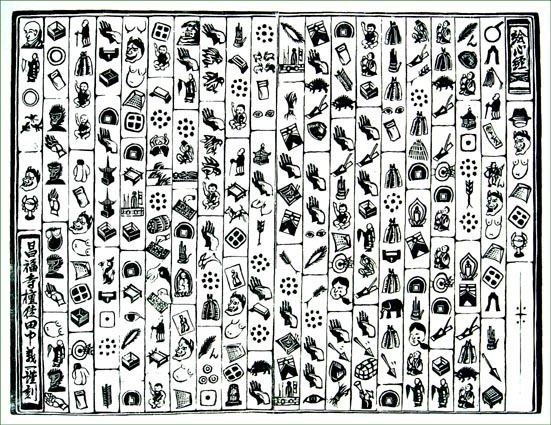Hi Guys,
The following is my slightly irreverent Heart Sutra pronunciation guide. I have seen something like it available in Japan, but not in English. Here is how it works:
I will take ordinary English words that sound as close as possible to stand for each of the following. For example:
Shin = Shin (of the leg)
Disregard any part of a word in parenthesis ( ) as if it was cut away. For example, “fool” for “fu” here:
Fu = Foo(l)
I apologize right now if this ends up being biased toward Yankee pronunciations. Our friends from other places might adjust for worldwide versions.
A couple of pointers:
Two words together are meant to be said as one two syllable word quickly. For example, “Maka” sounds like “ma” (of “mama) and “car” (with the 'r' cut off), said as one quick two syllable words, thus:
Maka = Ma(ma) Ca(r)
Words with “u” at the end such as “Soku” usually – but not always – have a “u” sound at the end that sounds like the French word for water “eau” or the “ooh” of "ooh la la". If you listen to the following recording, the “ooh” is sometimes so subtle, and barely pronounced, that it can sound almost like a one syllable word. So, “Soku” would be:
Soku = Soak(the dishes) ooh (la la, but barely pronounced)
One should listen closely and compare the below with this Japanese version for practice:
Shall we see how this goes? Maybe we can even ask someone to make an animated version sometime! That would be cool. :=9
Gassho, Jundo
SatTodayLAH
====================================
Maka = Ma(ma) Ca(r to drive)
Hannya = Han(Solo of Star Wars, rhymes with man's name Ron) (Italian lasag)na
Haramita = Ha(ha ha) ra(h rah sis boom bah) me(and you) ta(r the road)
Shin = Shin (of the leg)
Gyo = ( Large Bi)gyo(yo toy)
Kan = Kahn (of Star Trek)
Ji = Gee (whiz)
Zai = Xy(lophone)
Bo = (Stallone is Ram)bo
Satsu = (They) sats (down) ooh (NOTE: Rather than “sats”, closer to “sots” as in “besotted”. Also, some Japanese abbreviate this to "Sa," most do not)
Gyo = (Large Bi)gyo(yo toy)
Jin = Gin (Rummy)
Han = Han (Solo, rhymes with man's name Ron)
Nya = Italian lasag)na
Ha = Ha (ha ha)
Ra = Ra (ra sis boom bah)
Mi = Me (and you)
Ta = Ta(r the road)
Ji = Gee (Whiz)
Sho = Show (time)
Ken = Ken (and Barbie)
Go = Go (Away)
On = Own (a house)
Kai = Ki(te to fly)
Ku = Coo (went the pigeon)
Do = Doe (a female deer)
I = Ea(t your breakfast)
Sai = Sigh (with love)
Ku = Coo (went the pigeon)
Yaku = (Boating ka)yak ooh (la la, subtle)
Sha = Sha (of Iran)
Ri = Rea(d a book)
Shi = She (and him)
Shiki = Shick (razors) key (and lock)
Fu = Foo (Fighters) or for the older crowd, Foo(l me once, shame on me)
I = ea(t your breakfast)
Ku = Coo (went the pigeon)
Ku = Coo (went the pigeon)
Fu = Foo (Fighters)
I = Ea(t your breakfast)
Shiki = Shick (razors) key (and lock)
Shiki = Shick (razors) key (and lock)
Soku = Soak (the laundry) ooh (la la, subtle)
Ze = Ze(ppelin)
Ku = Coo (went the pigeon)
Ku = Coo (went the pigeon)
Soku = Soak (the laundry) ooh (la la, subtle)
Ze = Ze(ppelin)
Shiki = Shick (razors) key (and lock)
Ju = Jew (in Tel Aviv)
So = Sew (a button)
Gyo = (Large Bi)gyo(yo toy)
Shiki = Shick (razors) key (and lock)
Yaku = (Boating ka)yak ooh (la la, subtle)
Bu = Boo (went the ghost)
Nyo = (The eggs were u)nyo(ked)
Ze = Ze(ppelin)
Sha = Sha (of Iran)
Ri = Rea(d a book)
Shi = She (and he)
Ze = Ze(ppelin)
Sho = Show (time)
Ho = Ho (ho ho says Santa)
Ku = Coo (went the pigeon)
So = Sew (a button)
Fu = Foo (Fighters)
Sho = Show (time)
Fu = Foo (Fighters)
Metsu = (Baseball's New York) Mets ooh (la la, subtle)
Fu = Foo (Fighters)
Ku = Coo (went the pigeon)
Fu = Foo (Fighters)
Jo = Joe (man's name)
Fu = Foo (Fighters)
Zo = (Bo)zo (the clown)
Fu = Foo (Fighters)
Gen = (Once more a)gain
Ze = Ze(ppelin)
Ko = Co-(pilot)
Ku = Coo (went the pigeon)
Chu = Chew (your food)
Mu = Moo (went the cow)
Shiki = Shick (razors) key (and lock)
Mu = Moo (went the cow)
Ju = Jew (in Tel Aviv)
So = Sew (a button)
Gyo = (Large Bi)gyo(yo toy)
Shiki = Shick (razors) key (and lock)
Mu = Moo (went the cow)
Gen = (Once more a)gain
Ni = Knee (of the leg)
Bi = Bee (is buzzing)
Ze = Ze(ppelin)
Shin = Shin (of the leg)
Ni = Knee (of the leg)
Mu = Moo (went the cow)
Shiki = Shick (razors) key (and lock)
Sho = Show (time)
Ko = Co-(pilot)
Mi = Me (and you)
Soku = Soak (the laundry) ooh (la la, subtle)
Ho = Ho (ho ho says Santa)
Mu = Moo (went the cow)
Gen = (Once more a)gain
Kai = Ki(te to fly)
Nai = Nigh(t and day)
Shi = She (and he)
Mu = Moo (went the cow)
I = Ea(t your breakfast)
Shiki = Shick (razors) key (and lock)
Kai = Ki(te to fly)
Mu = Moo (went the cow)
Mu = Moo (went the cow)
Myo = (Jewelry Ca)meo (said really fast)
Yaku = (Boating ka)yak ooh (la la, subtle)
Mu = Moo (went the cow)
Mu = Moo (went the cow)
Myo = (Jewelry Ca)meo
Jin = Gin (Rummy)
Nai = Nigh(t and day)
Shi = She (and he)
Mu = Moo (went the cow)
Ro = Row (your boat)
Shi = She (and he)
Yaku = (Boating ka)yak ooh (subtle)
Mu = Moo (went the cow)
Ro = Row (your boat)
Shi = She (and he)
Jin = Gin (rummy)
Mu = Moo (went the cow)
Ku = Coo (went the pigeon)
Shu = Shoe (to wear)
Metsu = (Baseball's New York) Mets ooh (la la, subtle)
Do = Doe (a female deer)
Mu = Moo (went the cow)
Chi = Chee(se and crackers)
Yaku = (Boating ka)yak ooh (la la, subtle)
Mu = Moo (went the cow)
Toku = Toke (a smoke) ooh (la la, subtle)
I = Ea(t your breakfast)
Mu = Moo (went the cow)
Sho = Show (time)
Tok- = Toe (of the foot)
ko = Co-(pilot)
Bo = (Stallone is Ram)bo
Dai = Die (and live another day)
Sat = (Bes)sot(ed)
Ta = Ta(r the road)
E = E(dward)
Han = Han (Solo, rhymes with man's name Ron)
Nya = (Italian lasag)na
Ha = Ha (ha ha)
Ra = Ra (ra sis boom bah)
Mi = Me (and you)
Ta = Ta(r the road)
Ko = Co-(pilot)
Shin = Shin (of the leg)
Mu = Moo (went the cow)
Kei = (O)kay
Ge = Ge(t me a hammer)
Mu = Moo (went the cow)
Kei = (O)kay
Ge = Ge(t me a hammer)
Ko = Co(-pilot)
Mu = Moo (went the cow)
U = Ooh (La La)
Ku = Coo (went the pigeon)
Fu = Foo (Fighters)
On = Own (a house)
Ri = Rea(d a book)
Is- = Ea(t your breakfast)
Sai = Sigh (with love)
Ten = 10
Do = Doe (a female deer)
Mu = Moo (went the cow)
So = Sew (a button)
Ku = Coo (went the pigeon)
Gyo = (Large Bi)gyo(yo toy)
Ne = Ne(xt in line)
Han = Han (Solo, rhymes with man's name Ron)
San = San (rhymes with man's name Ron)
Ze = Ze(ppelin)
Sho = Show (time)
Butsu = Boots (to wear) ooh (la la, subtle)
E = Eh (What did you say?)
Han = Han (Solo, rhymes with man's name Ron)
Nya = (Italian lasag)na
Ha = Ha (ha ha)
Ra = Ra (ra sis boom bah)
Mi = Me (and you)
Ta = Ta(r the road)
Ko = Co-(pilot)
Toku = Toke (a smoke) ooh (la la, subtle)
A = (Doctor's “Open wide, say) Ah
Noku = No (not yes) Coo (says the pigeon)
Ta = Ta(r the road)
Ra = Ra (ra sis boom bah)
San = San (rhymes with man's name Ron)
Myaku = Mia (Culpa) Coo (says the pigeon) … said fast …
San = San (rhymes with man's name Ron)
Bo = (Stallone is Ram)bo
Dai = Die (and live another day)
Ko = Co-(pilot)
Chi = Chee(se and crackers)
Han = Han (Solo, rhymes with man's name Ron)
Nya = (Italian lasag)na
Ha = Ha (ha ha)
Ra = Ra (ra sis boom bah)
Mi = Me (and you)
Ta = Ta(r the road)
Ze = Ze(ppelin)
Dai = Die (and live another day)
Jin = Gin (Rummy)
Shu = Shoe (to wear)
Ze = Ze(ppelin)
Dai = Die (and live another day)
Myo = (Jewelry Ca)meo (said really fast)
Shu = Shoe (to wear)
Ze = Ze(ppelin)
Mu = Moo (went the cow)
Jo = Joe (man's name)
Shu = Shoe (to wear)
Ze = Ze(ppelin)
Mu = Moo (went the cow)
To = Toe (of the foot)
Do = Doe (a female deer)
Shu = Shoe (to wear)
No = No (and yes)
Jo = Joe (man's name)
Is = Ea(t your breakfast)
sai = Sigh (with love)
Ku = Coo (said the pigeon)
Shin = Shin (of the leg)
Jitsu = (Gad)gets, but 'i' sound as in Ju-Jitsu
Fu = Foo (Fighters)
Ko = Co-(Pilot)
Ko = Co-(Pilot)
Setsu = (Television) sets ooh (la la, subtle)
Han = Han (Solo, rhymes with man's name Ron)
Nya = (Italian lasag)na
Ha = Ha (ha ha)
Ra = Ra (ra sis boom bah)
Mi = Me (and you)
Ta = Ta(r the road)
Shu = Shoe (to wear)
Soku = Soak (the laundry) ooh (la la, subtle)
Setsu = (Television) sets ooh (la la, subtle)
Shu = Shoe (to wear)
Watsu = Whatsu(p?)
Gya = (Bi)g ya(cht to sail)
Tei = Ta(ke my hand)
Gya = (Bi)g ya(cht to sail)
Tei = Ta(ke my hand)
Ha = Ha (ha ha)
Ra = Ra (ra sis boom bah)
Gya = (Bi)g ya(cht to sail)
Tei = Ta(ke my hand)
Hara = Ha (ha ha) Ra (ra sis boom bah)
So = Sew (a button)
Gya = (Bi)g ya(cht to sail)
Tei = Ta(ke my hand)
Bo = (Stallone is Ram)bo
Ji = Gee (whiz)
Sowa = So wha(t?)
Ka = Ca(r to drive)
Hannya = Han(Solo of Star Wars, rhymes with man's name Ron) (Italian lasag)na
Shingyo = Shin (of the leg) ( Large Bi)gyo(yo toy)





 Reply With Quote
Reply With Quote




 Love it! Thank you Jundo.
Love it! Thank you Jundo.





 So, a French lesson with your Japanese.
So, a French lesson with your Japanese. 














